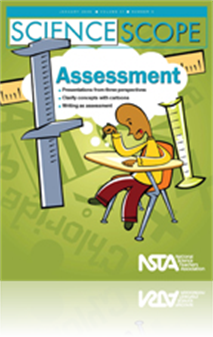All Science Scope resources
Journal Article
Assessing Student Presentations From Three Perspectives
Analyzing student presentations from three perspectives—expert, peer, and self—provides extended feedback and opportunities to learn. All three of these are helpful and serve different purposes. The expert (teacher) feedback shows how the teacher...
Journal Article
Tried and True: Cell City WebQuest
WebQuests are online activities that require students to read, analyze, and synthesize information found on the web. To facilitate instruction and student inquiry, the WebQuest, Cell City, can be used to teach students the names and functions of all ...
Journal Article
Editor’s Roundtable: Monitoring and assessing student learning
An effective teacher never leaves a key part of a lesson without checking to make sure there is an appropriate level of mastery before moving on to the next lesson segment. Teachers must monitor and assess student learning and then adjust their instr...
Journal Article
Science Sampler: Validating assessment—Teacher study groups
Teacher study groups are a valuable method of examining the validity of classroom assessments and determining how well the assessments align with student learning goals. The implementation of teacher study groups is based on a model from the Schools ...
Journal Article
Science Sampler: Reflecting on the test
The author created a reflective “minds-on” activity that would challenge students to accept responsibility for their own learning and performance (NRC 1996). The end result is a simple and useful activity called the science-test reflection. The s...
Journal Article
Assessing student-led, open-ended scientific inquiry holds a unique problem for classroom teachers because of the diverse skills and content that emerge from student work. This article provides tangible strategies for teachers to assess divergent stu...
Journal Article
Teacher’s Toolkit: Facilitating an inquiry-based science classroom
Despite recommendations from the National Science Education Standards and best practices for teaching science through inquiry-based methods, many teachers continue with traditional teaching methods citing management issues as the central obstacle. Th...
Journal Article
This month, Mercury will start becoming visible over the western horizon shortly after sunset. If you have students observe Mercury, they should do so at approximately the same time for each observation. During the first half of the month, Mercury wi...
Journal Article
Teaching Earth Science Using Hot Air Balloons
Constructing model hot air balloons is an activity that captures the imaginations of students, enabling teachers to present required content to minds that are open to receive it. Additionally, there are few activities that lend themselves to integrat...


